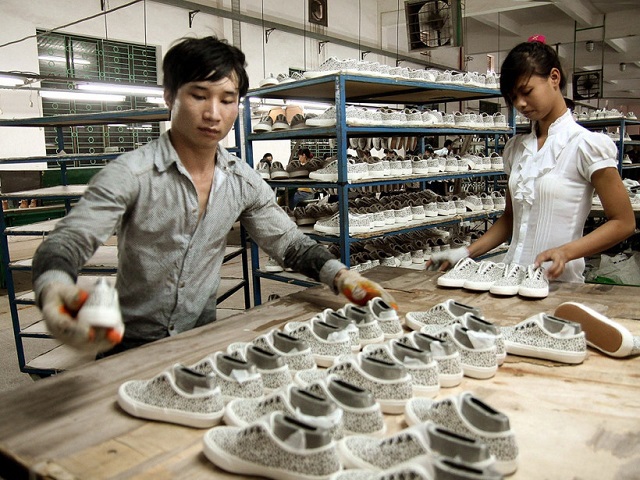
Amidst deep integration, Vietnamese businesses face myriad challenges, from intense competition to policy-related barriers. (Image: Vietnam+)
|
October 13th, Vietnamese Entrepreneurs’ Day, serves not only as a tribute to the significant contributions of entrepreneurs to the nation’s development but also as a moment to heed their candid voices.
These voices echo the struggles, hurdles, and hardships faced in business. Understanding and addressing these challenges from regulatory bodies not only offer encouragement but also unlock the vast potential of the economy.
Intellectual Property Woes and Business Bottlenecks
Despite government efforts to enhance the business environment, Vietnamese enterprises still encounter numerous obstacles hindering their growth.
In a recent discussion, Mr. Pham Truong Giang, CEO of Eurohouse Vietnam JSC, shared that Eurohouse fell victim to intellectual property infringement when a competitor blatantly copied their registered industrial design, “Shaped Metal Bar” (Design No. 33411).
Despite Eurohouse’s proactive measures and conclusive evidence of infringement, legal loopholes allowed the violator to continue production and sales unabated, as physical evidence of circulating goods was required for prosecution.
Mr. Giang highlighted systemic flaws: despite conclusive expert opinions, authorities demand direct seizure of infringing goods, burdening victims and enabling violators to evade punishment. Lenient penalties and fragmented enforcement further exacerbate the issue, undermining intellectual property protection.
Beyond intellectual property, businesses face multifaceted challenges across critical sectors. The Vietnam Industrial Parks Finance Association (VIPFA) highlighted legal complexities hindering operations within industrial zones.
In investment, overlapping regulations (e.g., Investment Law, Land Law, Construction Law, Environmental Protection Law) create procedural inefficiencies, delaying project implementation. Ambiguous tax incentives and protracted VAT refunds strain financial planning, particularly for foreign investors.
Customs procedures, despite reforms, remain cumbersome, with inconsistent product classification and redundant inspections increasing costs and reducing competitiveness.
 Businesses advocate for enhanced inter-agency coordination among intellectual property, market management, economic police, and judiciary bodies. (Image: Vietnam+)
|
In healthcare and food safety, regulatory complexities threaten business operations. Eurocham’s Food and Nutrition Group highlighted draft amendments to Decree 15/2018/ND-CP, which impose burdensome procedures, risking technical secrecy and product integrity.
Technological autonomy remains elusive for domestic enterprises like Dien Truong Giang (TGE), whose internationally certified vacuum switchgear struggles for domestic adoption due to policy biases favoring foreign brands.
TGE’s Director, Mr. Nguyen Ngoc Thong, emphasized policy barriers and inadequate R&D support hinder local innovation, perpetuating reliance on imports and impeding industrialization.
Unlocking Potential, Elevating Competitiveness
Legal expert Pham Thanh Tuan highlighted land law inconsistencies, such as discrepancies between investment and land laws regarding joint ventures, creating unnecessary hurdles for project implementation.
 Businesses advocate for a risk-based post-audit approach, akin to advanced economies. (Image: Vietnam+)
|
Land allocation ambiguities and procedural delays further impede project progress, necessitating legal reforms for clarity and efficiency.
Entrepreneurs’ concerns underscore the need for a transparent, coherent legal framework. Priorities include legal harmonization, digitalized administrative procedures, tax reforms, and enhanced dialogue.
Protecting intellectual property requires societal commitment and robust measures against infringement, fostering innovation and competitiveness.
Addressing these challenges demands collaborative efforts from government and businesses alike. Regulatory reforms, administrative streamlining, and capacity building are essential for a sustainable business ecosystem.
Hanh Nguyen
– 11:36 13/10/2025
Expert Insights on Economic Shifts and Effective Strategies for Vietnamese Businesses
At the “Digital Gateway to the Global Market” event hosted by UOB Finlab, Mr. Suan Teck Kin, Managing Director of Global Economics and Market Research at UOB Bank, provided insightful analysis on macroeconomic trends and international market dynamics. His expertise empowered Vietnamese businesses to proactively strategize and seize global export opportunities.
The 2025 Top Tax-Contributing Enterprises Awards: Recognizing Businesses Contributing Hundreds of Thousands of Billions
The 2025 Top Tax-Contributing Enterprises Recognition Ceremony was a resounding success, celebrating the immense contributions of leading businesses to the nation’s economic growth. The event not only honored these economic powerhouses but also served as a platform for discussing opportunities and challenges amidst the powerful digital transformation wave.
The Great Economic Reorganization: Navigating Beyond the Middle-Income Trap
If implemented vigorously and effectively, this wave of institutional reform will have far-reaching impacts, creating a significant boost to the competitiveness of the Vietnamese economy in the medium to long term.




















